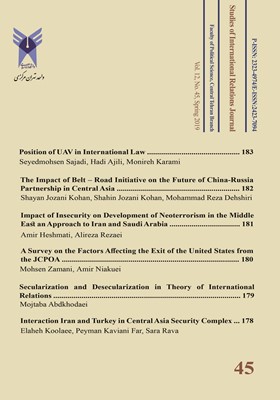A Survey on the Factors Affecting the Exit of the United States from the JCPOA
Subject Areas : International RelationsMohsen Zamani 1 , Seyed Amir Niyakuei 2 *
1 - Ph.D Student at the Guilan University
2 - Assistant Professor at the Guilan University
Keywords: JCPOA, Key words: Threat balance, Common idea, Foreign policy Trump,
Abstract :
Abstract: The American effort to quit the nuclear deal, called JCPOA, was a program Donald Trump had been running since the US presidential election. Eventually, the US government officially announced and resumed sanctions and declared readiness to re-negotiate Iran's willingness. The main question of the present article is what factors have contributed to the departure of the United States. The hypothesis is as follows: the Trump Foreign Policy Foundations, the persistence of the threatening nature of Iran after the introduction of the common sense between the United States, Israel and Saudi Arabia over the threat of Iran, its interpretation of the role of progress in strengthening the regional presence of Iran and the ignorance Considering this in the context of the internal and external implications, the post action of the Islamic Republic of Iran should be considered as one of the key variables in the decision of Donald Trump on the withdrawal JCPOA of the United States.
منابع:
1) حاجی یوسفی، امیر محمد(1382)، ایران و رژیم صهیونیستی از همکاری تا منازعه، تهران: انتشارات دانشگاه امام صادق.
2) کالاهان، پاتریک(1387)، «منطق سیاست خارجی آمریکا» نظریه های نقش جهانی آمریکا، ترجمه داوود غرایاق زندی، محمود یزدان فام، نادرپورآخوندی. تهران: پژوهشکده مطالعات راهبردی.
3) لیتل، ریچارد(1389)، نظریه های موازنه قوا، ترجمه غلامعلی چگنی زاده، تهران: انتشارات موسسه فرهنگی مطالعات و تحقیقات بین المللی ابرار معاصر.
4) مشیر زاده، حمیرا( 1386)، تحول در نظریه های روابط بین الملل، تهران، انتشارات سمت.
5) اسدی، علی اکبر(1386)،«رئالیسم و رویکردهای رقیب به سیاست خارجی»، فصلنامه راهبرد، سال نوزدهم ، شماره 56.
6) اندیشکده راهبردی تبیین(آذرماه 1395)،«سیاست خارجی دونالد ترامپ،چارچوب ها و جهت گیری های احتمالی » مچموعه مقالات.
7) پربن، دومنیک و دوگل لویی(1397)، «خروج ایالات متحده از توافقنامۀ وین پیرامون برنامۀ هسته ای ایران: یک وضعیت حقوقی متناقض» نسخه فارسی ترجمه شده توسط حقوقدانان انجمن کمیسیون مسائل ایران، تحلیلهای حقوقی.
8) دهقانی فیروزآبادی، سید جلال (پاییز1381)،« سیاست خارجی جمهوری اسلامی ایران ، روندها و بازتابها» ، فصلنامه مطالعات خاورمیانه، سال نهم ، شماره سوم.
9) سجادپور، سید محمد و اجتهادی ،سعیده (بهار 1389) ،«نگرش امنیتی غرب و تهدیدات بین المللی پس از جنگ سرد مطالعه موردی برنامه هسته ای جمهوری اسلامی ایران»، دو فصلنامه علمی – پژوهشی علوم سیاسی، دوره 6، شماره 11.
10)سلیمان زاده، سعید و امیدی، علی و براتی،سحر(1397)،« راهبرد سیاست خارجی ترامپ، هیبرید نوانزواگرایی و واقع گرایی »، فصلنامه مطالعات راهبردی سیاست گذاری عمومی، شماره 28.
11)سوری، روح الله (خرداد1397)،«خروج آمریکا از برجام، فرصت ها و موانع پیش رو»، مرکز بین المللی مطالعات صلح.
12)صالحی، سید حمزه و فرامرز منش، احسان(بهمن 1395)، «نقش برجام در تشدید واگرایی بین ایران وعربستان »، ماهنامه پژوهش ملل، دوره دوم، شماره14.
13)قوام، عبدالعلی و ایمانی همت« نظریه های رئالیستی در روابط بین الملل »، فصلنامه رهیافت های سیاسی و بین المللی، شماره 30
14)مشیرزاده، حمیرا و مسعودی، حیدر علی(1388)،« هویت و حوزه های مفهومی روابط بین الملل» فصلنامه سیاست، مجله حقوق و علوم سیاسی دانشگاه تهران، دوره39، شماره 4.
15)موسویان، سید حسین و حسینی، دیاکو(1395)،« منطق پیامدهای مطلوب و نامطلوب برجام» از کتاب برجام سیاست ها، دستاوردها، و الزامات، تهران، انتشارات پژوهشکده مطالعات راهبردی.
16)نوازنی، بهرام و قاسمی،حاکم و فرسائی، شهرام (زمستان 1394)، «ارزیابی محافل غربی از پیامدهای خاورمیانه ای برجام برای سیاست خارجی ایران» ، فصلنامه سیاست خارجی، سال بیست و نهم، شماره 4.
1) Barnaby, Frank (1989), The Invisible Bomb: The Nuclear Arms Race in the Middle East, London: I. B. Tauris, 1989, pp. 64-69.
2) Berman, Russell (2017), ' The Donald Trump Cabinet Tracker', The Atlantic, 2 March; Available at: https://www.theatlantic.com/politics/archive/2017/03/trump-cabinet-tracker/510527/
3) CBS NEWS. 2016. “Pence goes farther than trump on Iran deal, says US will rip up”. Available at: http://www.cbsnews.com/news/pence-goes-farther-thantrump- on-iran-deal-says-us-will-rip-up/(accessed 2 December 2017).
4) Chathamhouse (2016), "Iran's Politics and Foreign Policy", Chatham House, available at: https://www.chathamhouse.org/event/irans-politics-and-foreign-policy.
5) Clinton, Hilary. 2010. Clinton: U.S. Will Extend 'Defense Umbrella' Over Gulf if Iran Obtains Nuclear Weapons, from FOX NEWS: http://www.foxnews. Com/politics.
6) European Union (2016), "An EU Strategy for Relations with Iran after the Nuclear Deal, available at: http://www.europarl.europa.eu/RegData/etudes/IDAN/2016/578005/EXPO_IDA (2016) 578005_EN.pdf.
7) Haass R. 2017. “Trump foreign policy has found its theme: The Withdrawal Doctrine. US have left/threatening to leave TPP, Paris accord, UNESCO, NAFTA, JCPOA”. Twitter. Available at: https://twitter.com/RichardHaass/ status/918471381511229440 (accessed 12 October 2017).
8) Haass, R. 2016. “The Isolationist Temptation”. The Wall Street Journal. Available at: https://www.wsj.com/articles/the-isolationist-temptation-1470411481
9)Haass, Richard. N. (2006), “The New Middle East”, Foreign Affairs, November/December.
10) Kahl, Colin and Hal Brands (2017) 'Trump’s Grand Strategic Train Wreck', Foreign Policy, 31 January, Available at: http://foreignpolicy.com/2017/01/31/trumps-grand-strategic-train-wreck
11) Katzman, Kenneth (2016), "Iran’s Foreign Policy", Congressional Research Service, available at: https://www.fas.org/sgp/crs/mideast/R44017.pdf.
12) Kirshner, jonathan (2010), “the tragedy of offensive realism: classical realism and the rise of china”, European journal of international relations.
13) McAdams, Dan (2016) 'The Mind of Donald Trump', The Atlantic, 16 June; Available at: https://www.theatlantic.com/magazine/archive/2016/06/the-mind-of-donald-trump/480771/
14) Nasr, Vali (2006), “When the Shiites Rise”, Foreign Affairs.
15) Renshon, S. (2012), Barack Obama and the Politics of Redemption, New York: Routledge.
16) Shine, Sima (2016). "The Nuclear Deal is a Chance to Change Iran's Behavior", National Interest, available at: http://nationalinterest.org/feature/the-nuclear-deal-chance-change-irans-ehavior -17250.
17) Sick, Gary (2016), "Regional Implications of the JCPOA, The Daily Journalist, available at: http://thedailyjournalist.com/the-strategist/regionalimplications- of-the-jcpoa/.
18) Singh, Michael (2015), "Implications of the JCPOA for U.S. Policy in the Middle East", Washington Institute, available at: http://www.washingtoninstitute.org/policy-analysis/view/implications-of-the-jcpoa-for-u.s.-policy-in-the-middle-east.
19) Smith, S. and Hadfield, A. and Dunne, T. 2016. Foreign Policy: Theories, Actors, Cases. 3rd ed. Oxford: Oxford University Press.
20) Vatanka, Alex; U.S.-Iran Relations: Recommendations for the Next President, see http://www.mei.edu/sites/default/files/publications/PF17_Vatanka_IranUS_ web.pdf
21) Whitehouse.gov. 2017a. Remarks by President Trump in Joint Address to Congress, Available at: https://www.whitehouse.gov/the-press-office/2017/02/28/ remarks-president-trump-joint-address-congress (accessed 1 December 2017). (accessed 1 November 2017).
_||_
